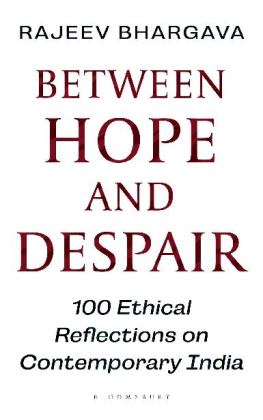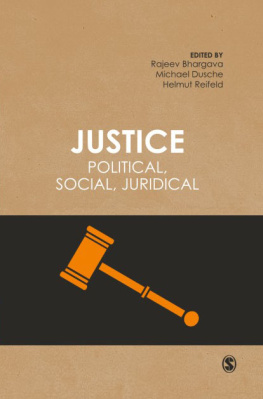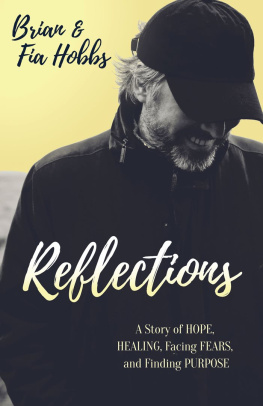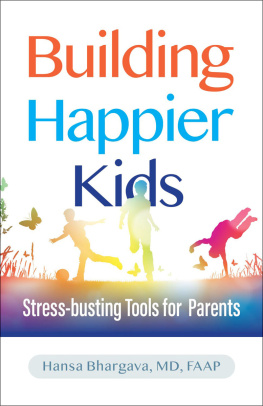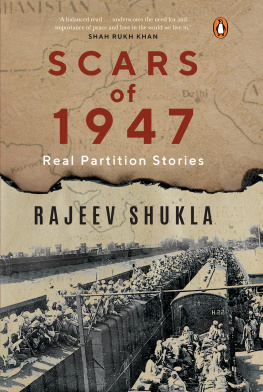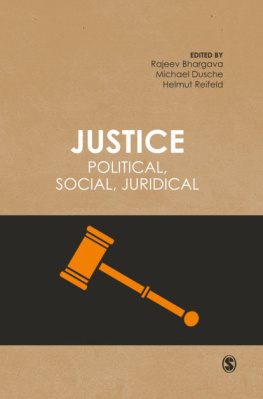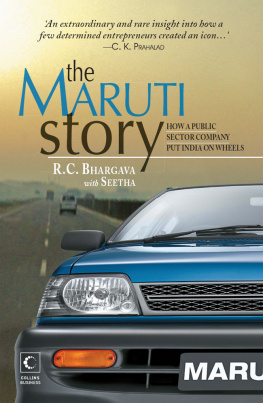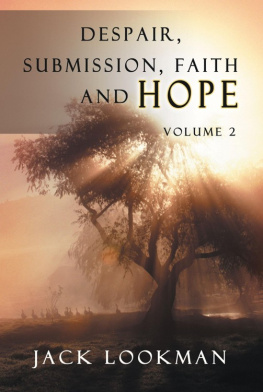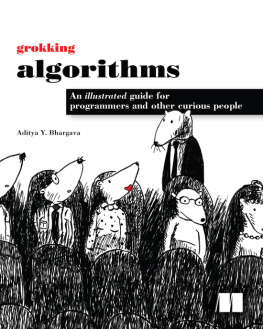BETWEEN HOPE AND DESPAIR
BETWEEN HOPE AND
DESPAIR
100 Ethical Reflections on
Contemporary India
Rajeev Bhargava
Advance Praise for Between Hope and Despair
Rajeev Bhargava, a scholar of eminence, has over the years written a good deal on the principles of political ethics with specific reference to contemporary Indian society. The present work sums up the challenge in its opening lines: Indias collective ethical identity is under duress. We dont seem to agree currently on what our collective good is. This makes for unsettling reading, more so in the light of his detailed commentary on the basic principles of our Constitution. But it also gives us hope because it reminds us of what as a nation we should and can achieve. Mandatory reading for those who wish to make India a better, more humane society.
Hamid Ansari, former vice president of India and chairman, Rajya Sabha (20072017)
Rajeev Bhargava writes because he cannot but write. Even as Ustad Rashid Khan cannot but sing, Malavika Sarukkai cannot but dance, Jatin Dass brush cannot be still and I cannot but read him for I want to see current affairs subjected to ethical analysis, valuational norms and the litmus test of What is the intention? And there, Bhargavas writing never fails me.
Gopalkrishna Gandhi, former governor of West Bengal
Rajeev has been writing, objectively and analytically, on various issues now emerging as challenges to our constitutional ethos. This collection of essays is but a small sample of his thoughts written with uncanny foresight. He raises many provocative questions in his essays and tells us where we are in fulfilling the dream of a just, fair and equal society and where our constitutional democracy is taking us, slowly but surely.
Madan Lokur, former justice of Supreme Court of India
Rajeev Bhargavas Between Hope and Despair is a thoughtful look at the social and moral turmoil that faces us in modern India. Examining the nations past and present while looking towards its future, Bhargavas writing covers a wide range of issues, producing an elegant reflection on Indias crisis of ethics.
Shashi Tharoor, MP, author and public intellectual
Rajeev, the optimist, through his latest book, Between Hope and Despair , wishes to heal the growing divisions in India over its identity. He lucidly, insightfully states his own views and hopes a proper response from others will start a meaningful dialogue. Indeed, each of us can dip into this collection, choose an essay on one of the many relevant issues, reflect on it and contribute to this conversation.
Anu Aga, former chair of Thermax and Teach for India
The nuance and complexity that Rajeev brings into every question is invaluable. He nudges us towards the possibility of a more equal and just society.
T.M. Krishna, musician and writer
This is a deep and probing analysis of Indias democracy as it is today. It was born out of a dream of inclusivity. But the fact is, it stands over an area marked by age-old fault lines of caste, class, religion and gender. These essays are a profound analysis of how the unavoidable seismic jolts have shaped and reshaped India in the last 75 years.
Mrinal Pande, writer and former chief editor of Hindustan Dainik
BLOOMSBURY INDIA
Bloomsbury Publishing India Pvt. Ltd
Second Floor, LSC Building No. 4, DDA Complex, Pocket C 6 & 7,
Vasant Kunj, New Delhi, 110070
BLOOMSBURY, BLOOMSBURY INDIA and the Diana logo are trademarks of Bloomsbury Publishing Plc
First published in India 2022
This edition published 2022
Copyright Rajeev Bhargava, 2022
Rajeev Bhargava has asserted his right under the Indian Copyright Act to be identified as the Author of this work
All rights reserved. No part of this publication may be reproduced or transmitted in any form or by any means, electronic or mechanical, including photocopying, recording or any information storage or retrieval system, without the prior permission in writing from the publishers
This book is solely the responsibility of the author and the publisher has had no role in the creation of the content and does not have responsibility for anything defamatory or libellous or objectionable
Bloomsbury Publishing Plc does not have any control over, or responsibility for, any third-party websites referred to or in this book. All internet addresses given in this book were correct at the time of going to press. The author and publisher regret any inconvenience caused if addresses have changed or sites have ceased to exist, but can accept no responsibility for any such changes
ISBN: HB: 978-93-94701-37-3; eBook: 978-93-94701-50-2
Created by Manipal Technologies Limited
To find out more about our authors and books visit www.bloomsbury.com and sign up for our newsletters
For my grandson, Miran,
and the future of all the children of his generation
Contents
In more than forty years of my academic life, I had written all of five newspaper articles. Yet for some reason, I was approached, in the past decade, by several national and international dailies and weeklies to write for them. I declined out of diffidence, reticence and a feeling that I didnt have the competence to write for the larger, non-academic audience. So when Mini Kapoor of The Hindu asked me to write a column, I balked at the very idea of a weekly deadline. I felt the sheer pressure of producing a regular column would interfere with academic writing.
But my daughters, Vanya and Aranyani, and my sons-in-law, Shiva and Ganesh, unfailingly persuaded me to move beyond the classroom and commit myself to public writing. Vanya and Shiva, in particular, insisted that their friends and acquaintances desperately needed exposure to political theory. Tani, my wife, pushed me to take the plunge as enthusiastically as she always has. I must thank them all for helping me turn from an academic to a more public-spirited writer.
I must also thank the editorial team of The Hindu , particularly Mini Kapoor and V.R. Srinivasan, for not giving up on me when I first prevaricated. Eventually, I relented on three conditions. First, that I would write every fortnight not every week. Second, that I would be free to choose the topic of every column. And third, that the content need not be tied to current affairs but have general social, political or philosophical significance. Vanya insisted that each piece focus on conceptual clarification for a primarily young readership. Both Tani and Vanya helped with the choice of themes and went over the writings to ensure that they were accessible. So did the copy editors at The Hindu : Murali Krishnaswamy, Radhika Santhanam and G.L. Narayanan.
Initially, the column was called The Public Eye and appeared in the Sunday Review . Later when the Sunday supplement was discontinued, I got a little more space as it moved to the op-ed page. After fifty-odd articles, I began to lose steam and wanted to cry off. At that stage, Srinivasan egged me on. Several friends read me regularly and carefully, and offered critical comments. Foremost among them were Alok Rai, Shalini Advani and Charles Taylor. Other consistently supportive readers include Patrick Olivelle, Hamid Ansari, Pamela Philipose, Ranjini Obeyesekhere, Neeladri Bhattacharya, Dr Ambrish Mittal, Laura Weisberg, Sanjeev Bhargava, Daniel Bell, Raghavendra Gadagkar, Ritu Menon, Anu Chenoy, Hilal Ahmad, Nikolas Kompridis, Shabana Azmi, Javed Akhtar, Joe Carens, T.M. Krishna and Jack Hawley. Pratap Bhanu Mehta, Mukul Manglik and Yogendra Yadav assured me that they were circulating these pieces among their students. That motivated me to keep going. The value of instant feedback was also brought home to me by Chitra Joshi, Nilufer Gole, Asaf Savat, Dr Navin Dang, Anup Jhalani, Sudipta Mandal, Rakesh Pande, Ananya Vajpeyi, Pogy Menon, Dr Amit Sen, Kamalini Dutta, Tanika Sarkar, Mini and Abhi Chatterjee, Nilanjana Kaviraj, Madan Lokur, Romila Thapar, Deepak Nayyar, Deepankar Gupta, Ajay Shankar, Seema Chishti, K.T. Ravindran, Sanjaya Baru, David Wong, Anthony Barnett, Pamela DeLargy, Andrew and Peggotty Graham, Aube Taylor, Nissim, Mannathukkaren, Ramesh Dixit, Rajendra Prasad, Aryama, Sudha Mohan, Parthiv Shah, Anant Shah and Anvesh Sathpathy. I am sure there are many others who I ought to thank but have missed out. I am equally unable to mention the names of innumerable young men and women, probably students, who messaged me; I cant thank them enough for their stimulating comments. By their online comments, several readers of The Hindu spurred me to keep writing. Others took the trouble of locating my email address. Perhaps the most pleasant and satisfying remark came from one of them, Vivek, CEO of a startup. I am not a bad person, he said, but out of ignorance and lack of mentorship, I moved into pursuit of external goods and not internal goods. Now that I know the difference, I ask myself the core question of what kind of a good I want and why. You articulated the differences between external and internal goods really well.


